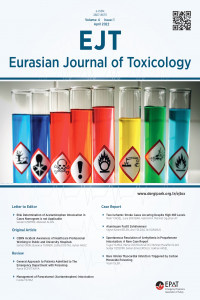Paria HABİBOLLAHİ, Samad SHAMS VAHDATİ, Maryam RAHİMPOUR ASENJAN, Shabnam PAHLEVAN, Amırreza JABBARIPOUR SARMADIAN, Sogand OMIDI
Level of Knowledge and Attitude of the Medical Educated People About Medicinal Herbs
Introduction: Lack of existence of traditional medicine based on the academic sciences and lack of a study on the knowledge of the community about the indication and contraindications and drug interactions with herbal remedies, we decided to investigate the attitudes and knowledge of people with medical education. Methods and materials: In this cross-sectional study, people from medical, nursing and pharmacy groups were selected randomly. Implicit consent was obtained from individuals. The questionnaire consisted of demographic characteristics and four parts of the questions were as following, the first part consisting of people's attitude, the second part containing questions related to indication, the third part of questions related to contraindication and the last part was about drug interactions. Results: In this study, 388 participants were enrolled. The mean age of the participants was 29.66 ± 8.37 years .180 were female (46.4%). Most patients (66%)rarely or occasionally recommend herbal remedies. Most participants (68%) occasionally or rarely recommend herbal medicines as an alternative for common medicine. 256 participants (66%) believe that the use of herbal remedies has increased and 112 (28.9%) declare unawareness and 20 (5.2%) believe that Consumption has not increased. The reason for increased use is often that people think these drugs are natural. Conclusion: Most participants do not have enough information about herbal remedies and medications and often claim that because herbal remedies are natural, cheaper and less risky, the tendency to herbal remedies and medicines has increased but the participants themselves often do not recommend replacing prescription medicine with them.
Anahtar Kelimeler:
Knowledge, Attitude, Herbal Remedies
Level of Knowledge and Attitude of the Medical Educated People About Medicinal Herbs
Introduction: Lack of existence of traditional medicine based on the academic sciences and lack of a study on the knowledge of the community about the indication and contraindications and drug interactions with herbal remedies, we decided to investigate the attitudes and knowledge of people with medical education. Methods and materials: In this cross-sectional study, people from medical, nursing and pharmacy groups were selected randomly. Implicit consent was obtained from individuals. The questionnaire consisted of demographic characteristics and four parts of the questions were as following, the first part consisting of people's attitude, the second part containing questions related to indication, the third part of questions related to contraindication and the last part was about drug interactions. Results: In this study, 388 participants were enrolled. The mean age of the participants was 29.66 ± 8.37 years .180 were female (46.4%). Most patients (66%)rarely or occasionally recommend herbal remedies. Most participants (68%) occasionally or rarely recommend herbal medicines as an alternative for common medicine. 256 participants (66%) believe that the use of herbal remedies has increased and 112 (28.9%) declare unawareness and 20 (5.2%) believe that Consumption has not increased. The reason for increased use is often that people think these drugs are natural. Conclusion: Most participants do not have enough information about herbal remedies and medications and often claim that because herbal remedies are natural, cheaper and less risky, the tendency to herbal remedies and medicines has increased but the participants themselves often do not recommend replacing prescription medicine with them.
Keywords:
Knowledge, Attitude, Herbal Remedies,
___
- 1. Matthews HB, Lucier GW, Fisher KD. Medicinal herbs in the United States: research needs. Environmental health perspectives. 1999 Oct;107(10):773-8.
- 2. Angell M, Kassirer, JP. Alternative medicine-the risks of untested and unregulated remedies. N EngI J Med 339:839-841 (1998).
- 3. Journal of the American Medical Association (JAMA) 280 (1998).
- 4. Bass IS, Young AL. Dietary Supplement Health and Education Act: A Legislative History and Analysis. Washington, DC:The Food and Drug Law Institute, 1996.
- 5. Commission on Dietary Supplement Labels. Report of the Commission on Dietary Supplement Labels, Report to the President, Congress, and The Secretary of the Department of Health and Human Services. Washington, DC:U.S. Government Printing Office, 1997.
- 6. NIEHS news: herbal health. Environ Health Perspect 106:A590-A592 (1998).
- 7. Jonas WB. Alternative medicine-learning from the past, examining the present, advancing to the future. JAMA 280:1616-1618 (1998).
- 8. Fontanarosa PB, Lundberg GD. Alternative medicine meets science. JAMA 280:1618-1619 (1998).
- Yayın Aralığı: Yılda 3 Sayı
- Başlangıç: 2019
- Yayıncı: Acil Tıp Uzmanları Derneği
Sayıdaki Diğer Makaleler
Evaluation of Poisoning Case Followed in Intensive Care Units: Eskisehir Study
Sinem GÜRCÜ, Zeynep IRMAK KAYA, Serdar EFE
Serdar ÖZDEMİR, Abdullah ALGIN
Digoxin’s Interactions with Various Drugs and A Case Report
Fatma ŞENGÜL, Muhammed Ulvi YALCİN, Hüsamettin VATANSEV, Hakan ÇOMAKLI
Level of Knowledge and Attitude of the Medical Educated People About Medicinal Herbs
Paria HABİBOLLAHİ, Samad SHAMS VAHDATİ, Maryam RAHİMPOUR ASENJAN, Shabnam PAHLEVAN, Amırreza JABBARIPOUR SARMADIAN, Sogand OMIDI
Colchicine Intoxication In A Patient With Unilateral Renal Agenesis
